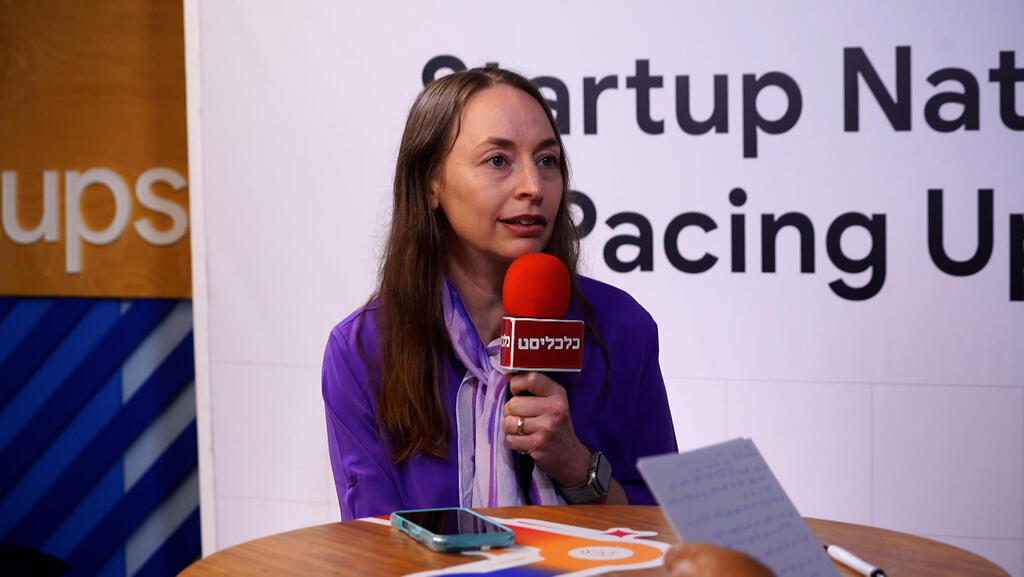
"We can't afford to move slowly in AI, not even in a body as large as the government"
Shira Lev Ami, CEO of the National Digital Agency, was speaking at Google and Calcalist's Startup Week.
“The government is not replacing the business sector, which is the engine of the economy. Rather, it plays a complementary role, helping to ensure that the benefits of innovation reach the entire public, while minimizing potential harm. The same is true in the field of AI,” said Shira Lev Ami, CEO of the National Digital Agency, speaking at Google and Calcalist's Startup Week.
Lately, there have been claims that Israel might miss the AI train. How do you respond to that, and what is the National Digital Agency doing to prevent it?
“Just like with the internet, there’s no such thing as ‘missing it’ altogether. The question is: What do you do with it? How do you leverage it to advance the country and make its economy more resilient to the changes it brings - in this case, AI? The government must lead this transformation. It doesn’t replace the business sector, which remains the engine of the economy, but it must ensure that the positive outcomes reach the wider public and that harm is minimized.
“We want to deliver better government services. When someone engages with the government, they should receive a holistic response, rather than having to chase their rights across multiple agencies. Our goal is for government to operate intelligently behind the scenes - connecting ministries, building digital bridges, and working in a way that’s smart, AI-powered, and data-driven. We want to activate the ‘government brain’ in a way that’s truly fit for the present.”
What does “AI infrastructure” mean on a national level? Are there sectors that should be prioritized?
“We don’t work sequentially - we work in parallel. The government is a large organization, and our processes take a long time to mature. That’s why we must advance all strategic initiatives simultaneously. If we work one step at a time, we’ll only get to health or transportation by 2040. So we’re working with all ministries, welfare, education, health, and transportation, to embed AI tools for internal use (to make operations smarter) and for external use (to improve public service).”
Related articles:
Can you give an example of how AI will be applied in education, healthcare, or transportation in the coming years?
“Education is a perfect example of a sector where digital progress has barely taken hold. There were many promises that it would be transformed, but the technology wasn’t ready. Now, AI allows for personalized teaching. For years, we’ve talked about personalization, now it’s actually possible. Every student can have a ‘private tutor’ in the form of a chatbot that knows their specific challenges and is available 24/7. In this new world of work, every employee, not just teachers, becomes a manager of a hybrid team, composed of both people and AI tools that can perform certain tasks better than humans.”
But are teachers prepared for the pace of this change?
“It’s true that, like other public sectors, we move slowly. But there is strong interest and willingness among educators. The Ministry of Education launched a chatbot for schools, and the adoption was overwhelming. The number of teachers and students who used it far exceeded expectations, because people recognize its value. It doesn’t have to threaten them; it doesn’t have to be a replacement. It can be an empowering force, a multiplier.”
Are you one of those who believe robots will take our jobs, and we’ll all be left idle?
“I believe the labor market is evolving, and what was is not what will be. We’re living in a new world. The job market my children are entering is fundamentally different from the one just a few years ago. It’s a hybrid environment, where technological tools complement human capabilities. Today, advanced companies know that one AI-assisted programmer can be as productive as ten human ones working 24/7. We’re seeing this across many fields. We need to learn to work with these tools, not against them.”
As the National Digital Agency, were you surprised by the speed and impact of this technology? Were you even prepared for this wave that hit us so suddenly?
“There’s no doubt AI demands a faster pace. You need to stay constantly up to date, know the latest models, the latest research, and what’s happening globally. It forces us to move quickly. The rise of AI, and particularly generative AI, caught everyone by surprise. These tools entered the market two and a half years ago, and at first, there was uncertainty. People wondered: What is this? Is it real? Is it just a toy that writes poems and stories?”
Do we have the luxury of taking our time to figure it out?
“One of our core missions is to help government ministries move faster, to provide technologies, tools, procurement channels, and legal frameworks that remove barriers and enable swift adoption. We’re here to help them keep pace with the change and prepare for what’s coming.”
Where do you see Israel’s national AI program in 10 or 20 years?
“The biggest shift will be in human-computer interaction. Tasks we once handled with a mouse and screen will increasingly be managed through multimodal chatbots, tools that can hear, see, understand videos, and interpret visual inputs. The interaction will feel like working with a human assistant, one who wants to help and offers complete solutions. Every touchpoint between people and institutions - whether government or business - will change. Expectations are shifting radically, and as an entity serving millions of Israelis, we must be ready to adapt our services to this new reality.”
